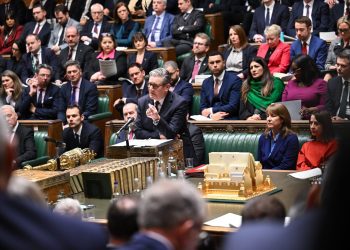Voters across England are heading to the polls as Keir Starmer’s government readies for its first major interaction with the electorate since winning office in July last year.
Labour is preparing for a difficult set of results — but it is Kemi Badenoch’s Conservative Party that is most exposed today. Of the 1,641 council seats up for grabs across 23 local authorities, trembling Tory incumbents are defending 954.
The majority of these council seats were last contested in May 2021, during a period of heightened popularity for the then-ruling Conservative Party and prime minister Boris Johnson. Badenoch is expecting a “correction” this time around, as the electoral landscape adjusts to the Conservatives’ current malaise.
In political terms, Johnson’s period of reinvigorated popularity — informed by Brexit goodwill and the Covid vaccine “bounce” — is ancient history.
The Liberal Democrats and Reform UK are expected to make considerable gains at the Conservative Party’s expense. A briefing to the Telegraph this morning suggests CCHQ predicts a total wipeout: a “confidential” memo projects that the Conservatives will lose control of all the councils they are defending — up to 770 seats — as well as all the mayoral elections taking place.
It’s possible that the Tories could win one mayoralty — perhaps Cambridgeshire and Peterborough — and suddenly declare that the results are not nearly as bad as the doomsayers foretold. (Think back to Ben Houchen’s victory in Tees Valley in 2024 and the subsequent spin). That is the nature of expectation management — and the stories pressured parties tell themselves, voters and the media, to artificially boost morale/spur positive coverage.
But such myths, as Rishi Sunak discovered in 2024, can only suspend reality for so long.
***This content first appeared in a special edition of Politics.co.uk’s Politics@Lunch newsletter, centring on the local elections. Sign-up for free and never miss our daily briefing.***
As far as Labour is concerned, dismal results will prompt questions about the direction of the party, the leadership’s chosen political narrative and its vulnerability — if borne out — across several flanks.
As alluded to, six mayoralties are also in play today, in the West of England, Cambridgeshire and Peterborough, North Tyneside, Doncaster, Greater Lincolnshire, and Hull and East Yorkshire. But perhaps the most symbolic test will be the Runcorn and Helsby by-election, triggered by former MP Mike Amesbury’s resignation after his conviction for punching a man.
Together, these contests have attracted (arguably outsized) national interest because of the potential for a major Reform breakthrough: a turquoise wave. Nigel Farage’s party is contesting more council seats than any of its opponents. Meanwhile, expectations are leaning towards a Reform victory in Runcorn, once a safe Labour seat. And Farage’s party fancies its chances in at least a couple of mayoral contests — namely Greater Lincolnshire, and Hull and East Yorkshire.
As the results roll in, commentators and analysts alike will look to decipher a “message” in the data — one directed at Westminster from a disillusioned electorate. But the prevalent picture is likely to be fractious, as challengers to the left and right of the main parties secure marked gains at their expense. “Electoral chaos theory”, as political scientist Rob Ford has termed it, will be put into practice.
Of course, an electoral tapestry — weaved of turquoise, orange, green, blue and red threads — will require some unpicking on Friday. But two possible trends piquing my interest pertain to the extent and depth of enthusiasm for Reform. In other words: will Reform voters turn out to vote?
More in Common polling notes that Reform voters do not typically participate in these kinds of contests — and yet they are uniquely motivated to express their discontent in this contest. Will Farage’s voters turn out for him on the day? Can he capitalise on his momentum and spur further coverage for his insurgent party?
Underperformance could see Westminster question some of Farage’s more braggadocious rhetoric. But consider the headlines if Reform meets expectations, or over-performs.
Another set of questions: will anti-Farage voters turn out for Reform’s opponents on the day? To what extent is there a tactical “stop Reform” vote across the country — a constituency willing to lend their support to a second, even third, preference to thwart Farage? To what extent can the major parties, Labour in particular, weaponise such a voter group at future elections?
I hope to feature answers to at least some of these questions in Saturday’s Week-in-Review newsletter.
Subscribe to Politics@Lunch
Lunchtime briefing
Tony Blair’s net zero stance ‘absolutely aligned’ with government policy, Starmer says
Lunchtime soundbite
‘All of those things have not happened, and you cannot just plough on regardless and throw all of these workers on the scrapheap’
— Sharon Graham, general secretary of Unite, tells Times Radio workers cannot be thrown “on the scrapheap” in the pursuit of net zero.
Now try this…
‘Blair’s net zero intervention invites scrutiny of his institute’s donors’
Labour insider rebukes ‘tech bros’ within Tony Blair Institute as critics question past work with petrostates, the Guardian’s Kiran Stacey writes.
‘UK local elections 2025: How to watch like a pro’
Via Politico.
‘Keir Starmer would harm Labour’s chances in Runcorn by-election, say Labour MPs’
PoliticsHome reports.
On this day in 2024:
Kemi Badenoch insists PM not ‘under threat’ regardless of local elections outcome
Subscribe to Politics@Lunch
The post What’s at stake in England’s local elections? appeared first on Politics.co.uk.

































